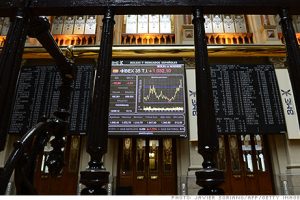Donald Trump’s plans for tax cuts and infrastructure spending has created a massive sell off in bonds. This has caused bond yields to rise (bond yield rise when bond prices drop).
When bond yields start to rise it means the market is factoring a rise in interest rates.
Previously the record low interest rates have persuaded investors to invest in the share market. The record low interest rates have made stock valuations look very attractive.
When an analyst evaluates a stock, they use the discounted cash flow method to assess whether the stock is an attractive buy. The analyst will use future free cash flow projections and discounts them to obtain a present value. To achieve this present value, they use 10 year bond yield to arrive to a present date value for that company. As bond yield rise, these discounted cash flow will rise and will make stock valuation look more expensive.

In record low interest rates, we can see that REITS and utilities benefit with a rise in stock prices. However with bond yields rising, These REITS and utility stocks have plummeted in stock price as their valuation incorporating the higher bond yields has essentially made their valuation look expensive. Hence these yield stocks have become out of favour and value stocks are now more popular.
The stock market will generally look more expensive from this rise in bond yields but this will affect yield stocks more than others. Good stocks will still be available in the market but picking the correct stock will be even more imperative in these current market conditions.
Make sure you bookmark our main blog page and come back regularly to check out the other articles and videos. You can also sign up for 8 weeks of our client research for free! Otherwise you can email Michael Gable directly at michael@fairmontequities.com
Disclaimer: The information in this article is general advice only. Read our full disclaimer HERE.

